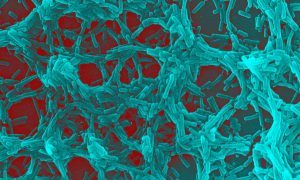Ian Sample in The Guardian:
 Researchers in Belgium found that people with depression had consistently low levels of bacteria known as Coprococcus and Dialister whether they took antidepressants or not.
Researchers in Belgium found that people with depression had consistently low levels of bacteria known as Coprococcus and Dialister whether they took antidepressants or not.
If the preliminary finding stands up to further scrutiny, it could pave the way for new treatments for mental health disorders based on probiotics that boost levels of “good” bacteria in the intestines.
Jeroen Raes of the Flanders Institute for Biotechnology and the Catholic University of Leuven drew on medical tests and GP records to look for links between depression, quality of life and microbes lurking in the faeces of more than 1,000 people enrolled in the Flemish Gut Flora Project.
He found that two kinds of bugs, namely Faecalibacterium and Coprococcus, were both more common in people who claimed to enjoy a high mental quality of life. Meanwhile, those with depression had lower than average levels of Coprococcus and Dialister.
More here.
